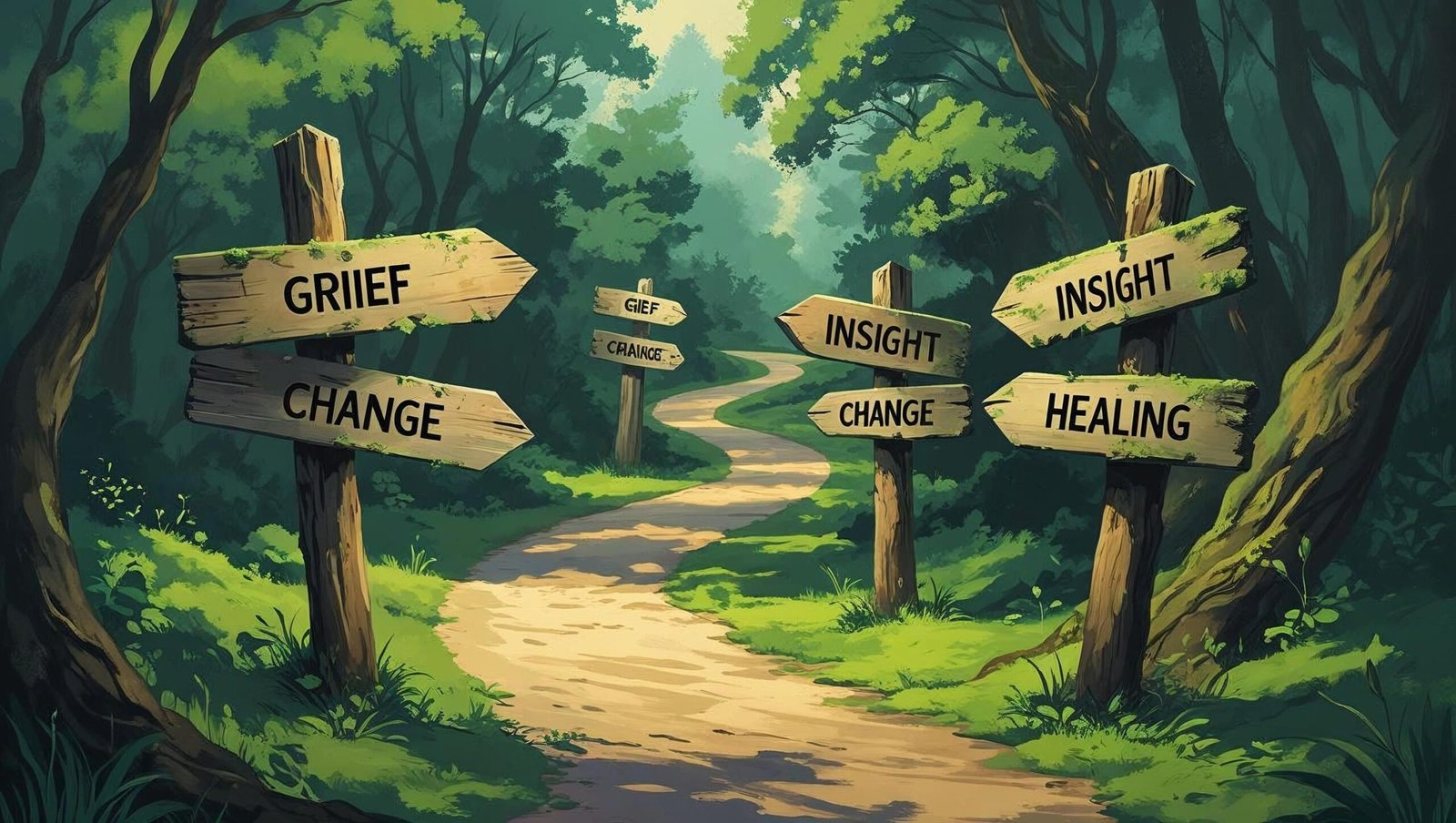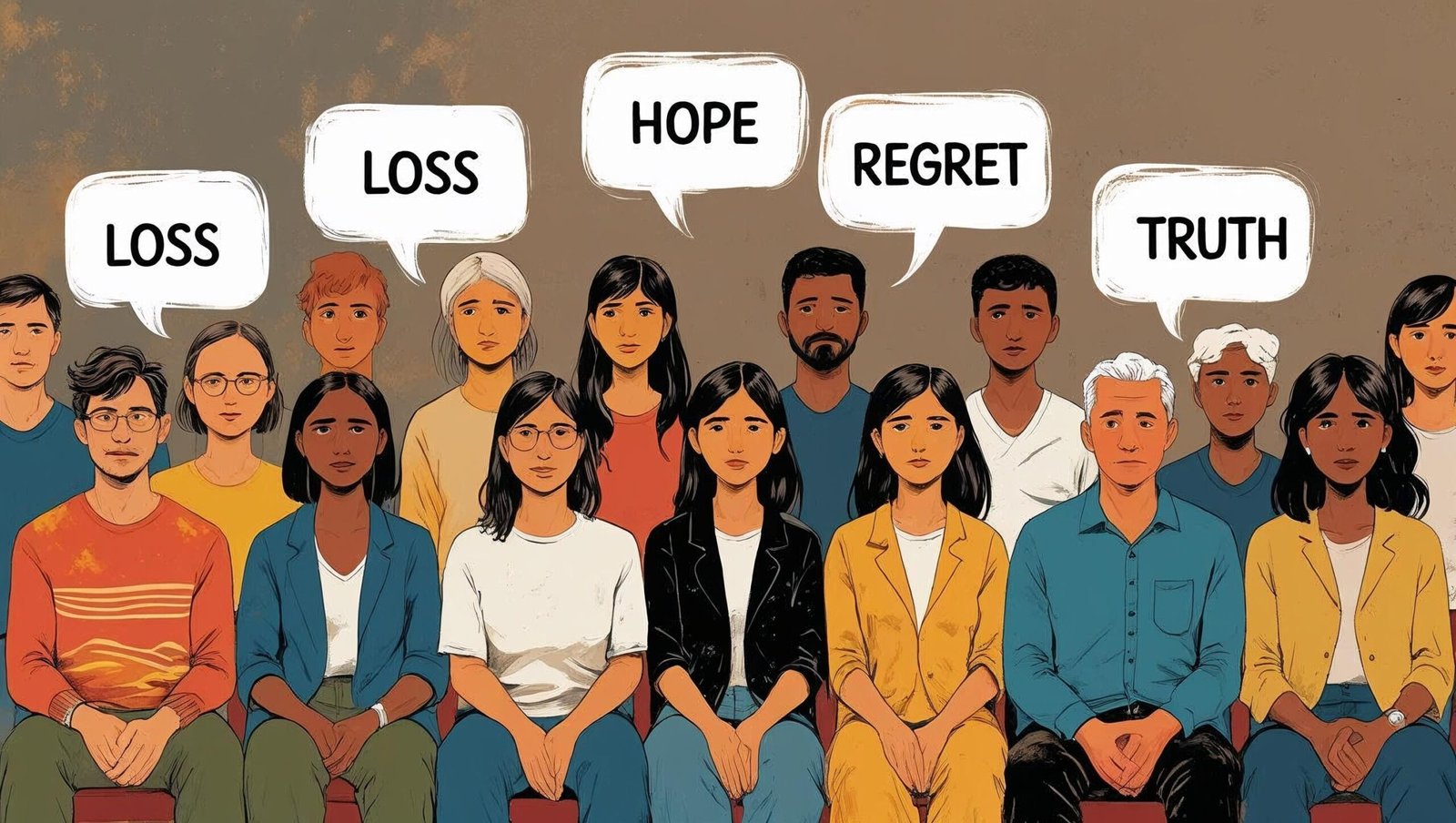Maybe You Should Talk to Someone: 7 Powerful Lessons from Lori Gottlieb’s Masterpiece
Maybe You Should Talk to Someone by Lori Gottlieb is not merely a self-help book. It’s a compelling intersection of memoir, case studies, and deeply human observations that explore the mysterious territory of the human mind. By sharing her own therapy sessions and those of her patients, Gottlieb dissects the vulnerabilities, contradictions, and brilliance of our emotional existence.
This review explores seven powerful life lessons derived from Maybe You Should Talk to Someone and how they resonate beyond the pages — into therapy rooms, relationships, and the quiet struggles we all carry. Throughout this post, we’ll reflect on Gottlieb’s candour, empathy, and the intricate dance between therapist and patient.

1. Therapists Are People Too
One of the most groundbreaking aspects of Maybe You Should Talk to Someone is Gottlieb’s unapologetic vulnerability. The book begins as she’s blindsided by a breakup that shakes her professional composure. As a therapist herself, this moment becomes a powerful mirror — showing that healers too are in need of healing.
In Maybe You Should Talk to Someone, the reader is gently reminded that therapists are not divine beings of emotional regulation. They are human first, shaped by grief, joy, heartbreak, and hope. Lori’s own therapy journey with Wendell is transformative not only for her, but for the reader who sees the layers beneath the clinical exterior.
This theme creates empathy, as readers come to see therapy as a mutual, sacred conversation — not a lecture or a clinical correction.
2. Change Is Both Terrifying and Liberating
In Maybe You Should Talk to Someone, every character — from John the cynical TV writer to Julie the young cancer patient — is undergoing a seismic shift. The book paints change not as a sudden triumph, but as a slow shedding of fear.
Gottlieb illustrates how people often seek therapy in moments of crisis but are afraid of the actual transformation that therapy invites. This contradiction forms the heartbeat of the narrative: we want change, but dread what we’ll have to leave behind.
Perhaps the book’s greatest strength is that it does not offer easy answers. Instead, Maybe You Should Talk to Someone suggests that discomfort is the passageway through which growth arrives — often quietly, and in fragments.
3. Our Stories Define Us Until We Reclaim Them
Lori introduces the idea of “editing our life story.” Many of the patients in Maybe You Should Talk to Someone carry narratives formed in childhood, trauma, or regret. These stories often sound absolute: “I am unlovable,” “People always leave,” “I’m too much.”
Therapy, as shown in the book, is not merely about fixing problems. It is about re-authoring these internal narratives. Gottlieb, through her own self-discovery and her patients’ arcs, demonstrates how reframing our stories can give birth to emotional liberation.
This theme is empowering because it places agency back in the hands of the individual. Maybe You Should Talk to Someone is a reminder that we are both the authors and editors of our stories — and it’s never too late to revise.
4. Insight Is Not Enough
One of the central epiphanies in Maybe You Should Talk to Someone is that awareness alone does not spark change. People can intellectually understand their patterns and still fall back into them.
Gottlieb writes, “Insight is the booby prize of therapy.” It’s clever, but it’s also a challenge. The real transformation occurs after insight — in the actions we take, the habits we shift, and the emotional risks we are willing to face.
Through her writing, Lori Gottlieb teaches that therapy is not a one-hour magic wand. Rather, it’s a collaborative process of being held accountable to our best, most honest selves. In Maybe You Should Talk to Someone, this principle repeats like a refrain — persistent and profound.
5. Grief Is Not Linear
The depiction of Julie’s journey — a young woman facing terminal cancer — is both devastating and uplifting. Through Julie, Maybe You Should Talk to Someone explores the nonlinear path of grief and acceptance.
Grief, as shown in the book, isn’t only about death. It’s also about lost dreams, broken relationships, and abandoned selves. Gottlieb treats grief not as a five-stage model but as a living, breathing force that evolves.
In illustrating Julie’s courage and the honesty she brought into every session, Lori Gottlieb makes grief a sacred process. Maybe You Should Talk to Someone does not sanitize death or pretend grief has a neat ending. It allows space for rawness — and in doing so, offers healing to readers who are grieving their own unnamed losses.

6. Connection Heals
A recurring theme in Maybe You Should Talk to Someone is the healing power of connection. Whether it is the bond between therapist and patient, or the raw interactions between patients and their own loved ones, the book reinforces the truth that humans are wired for connection.
The therapeutic alliance — what many call the most important predictor of therapy success — is painted in vivid detail. Gottlieb’s sessions with her therapist Wendell underscore the potency of being deeply seen and heard without judgment.
The title Maybe You Should Talk to Someone itself is an invitation. It suggests that in a world of filtered perfection and performative relationships, we all crave a sacred space to be authentic. And in that space, we are transformed.
7. Humour Belongs in Healing
Despite tackling emotionally heavy topics, Maybe You Should Talk to Someone sparkles with wit and humour. Gottlieb has a gift for levity — using it not to deflect but to deepen engagement. The humour is never at the expense of the client, but rather an acknowledgment that life is both tragic and comic, sometimes simultaneously.
By including awkward moments, ironic observations, and everyday absurdities, Lori brings accessibility to therapy. She shows that laughter isn’t separate from healing — it’s integral to it.
Deep Dive into the Psychological Undercurrents
One of the most compelling aspects of Maybe You Should Talk to Someone is the honest portrayal of psychological undercurrents that most self-help literature glosses over. Gottlieb unpacks the messiness of trauma, resistance to vulnerability, fear of abandonment, and the paradoxes that characterize the human condition.
In this way, the book becomes not just a window into therapy, but a mirror into the soul of modern existence. While reading it, you begin to realize that the conversations we avoid with ourselves are often the most important ones. Gottlieb brings to light the ways in which we deflect responsibility, cling to old wounds, and project our unresolved insecurities onto others.
But what’s remarkable is how gently she leads us through this labyrinth of internal struggle. Instead of pathologizing human behavior, she normalizes it. That’s what makes Maybe You Should Talk to Someone a book you don’t just read — you experience it.
Therapy as a Literary Landscape
There’s something remarkably literary about the way Lori Gottlieb constructs the narrative. Each chapter builds like a short story, with a narrative arc, rising tension, and moments of epiphany. The sessions with her patients, her interactions with her therapist, and her flashbacks into her personal life all come together in a way that feels almost novelistic.
Julie’s chapters, in particular, are heartbreaking and inspiring. Her terminal illness doesn’t define her character; rather, her clarity, humor, and unwavering sense of purpose do. Gottlieb doesn’t romanticize her pain, nor does she exploit it for emotional effect. Instead, Julie is rendered with dignity and complexity, as are the other clients whose stories we glimpse.
In Maybe You Should Talk to Someone, the therapy room becomes a literary space, one where stories are rewritten and futures are revised. This approach makes the book incredibly engaging even for readers who may have never considered therapy or mental health discussions before.
The Relatable Therapist
In much of mainstream media, therapists are portrayed as detached analysts, either too clinical or eerily omniscient. Gottlieb upends this stereotype with wit and courage. She allows readers into her own vulnerability, confusion, and even mistakes. In doing so, she doesn’t just humanize herself — she elevates the role of the therapist from a problem-solver to a fellow traveler.
The sessions between Lori and Wendell, her own therapist, are perhaps the most revealing. Wendell is not flashy, verbose, or overly emotional. He is calm, probing, and patient — all the things Lori needs but doesn’t initially want. Their relationship evolves from polite awkwardness to genuine connection, reflecting the stages many patients go through when opening up to a therapist.
By modeling how a therapist can grow and benefit from therapy, Maybe You Should Talk to Someone sends a strong message: mental health support is not reserved for the broken; it is vital for everyone who wishes to live deeply and truthfully.

Philosophy Meets Psychology
Though it’s never preachy or academic, the book contains several philosophical undertones. It encourages readers to examine their lives with curiosity rather than judgment. The core message aligns with ideas from existential therapy — that much of human suffering comes not from the situation itself, but from our interpretation of it.
Lori shows how meaning-making is central to healing. The patients in Maybe You Should Talk to Someone don’t “get better” in the traditional sense. They become more aware, more conscious, and more equipped to navigate life with grace and resilience.
This philosophical depth is a rare gift in mainstream psychological writing. The book dares to ask: What does it mean to live a meaningful life? What do we do when the answers change? How do we make peace with the fact that many questions may remain unanswered?
These are not easy themes, but Gottlieb handles them with poetic clarity.
Unpacking the Illusion of Control
A recurring theme throughout Maybe You Should Talk to Someone is our futile obsession with control. Whether it’s Lori’s own reaction to heartbreak or her clients’ desperate attempts to avoid pain, the narrative exposes how much time we spend trying to micromanage the unpredictable.
This message resonates in today’s world, where control is often conflated with security. But Lori challenges that notion. She posits that surrender — not submission — is the gateway to emotional freedom. Letting go, in her framework, is not about passivity but about trusting that one can cope with whatever life brings.
This lesson is particularly poignant in the story of Rita, a senior who feels she’s wasted her life. Through their work together, Rita comes to terms with her past not by changing it, but by owning it. Her eventual decision to pursue something meaningful late in life is a testament to the liberating power of surrender.
A Book That Stays With You
What makes Maybe You Should Talk to Someone unforgettable is its staying power. Long after you turn the last page, the voices in the book linger — not just Lori’s, but Wendell’s, Julie’s, John’s, and even your own. The reflections it provokes are not fleeting; they stay with you in moments of conflict, in quiet realizations, and in the gentle re-evaluation of how you perceive yourself and others.
The book also functions as a silent advocate for therapy. It breaks down the stigma without ever becoming preachy or overly didactic. It simply shows the value of emotional honesty, of holding space for others, and most importantly, for ourselves.
Cultural Significance
In an era where mental health discussions are finally entering the mainstream, Gottlieb’s book arrives like a lighthouse. It cuts through the fog of stereotypes, misconceptions, and fear with a beam of honesty and humanity. Its success is proof that people are hungry for stories that validate emotional complexity.
Maybe You Should Talk to Someone contributes to a broader cultural shift. It encourages conversations not just about therapy, but about parenting, grief, aging, anxiety, love, and identity. It reveals how therapy is not a last resort for the weak but a proactive step toward conscious living.
This cultural relevance, combined with the book’s literary grace, ensures its place among the most important personal development books of the decade.
Reframing Success and Healing
One of the most enlightening parts of Maybe You Should Talk to Someone is its insistence that healing is not the same as perfection. Success in therapy, as shown in the book, is not about being perpetually happy or completely “fixed.” It’s about developing insight, tolerating discomfort, and responding to life with more wisdom and kindness.
In this sense, Gottlieb redefines what it means to be mentally healthy. It’s not the absence of pain but the presence of awareness and the willingness to face what hurts. This view is both empowering and refreshing in a world addicted to quick fixes and five-step formulas.

A Quiet Revolution
Perhaps the book’s most radical act is its subtlety. It doesn’t shout or demand attention, yet it gently rearranges your perspective. You find yourself thinking more deeply about your interactions, your emotional triggers, your inherited patterns. That’s the quiet revolution Maybe You Should Talk to Someone inspires.
It also reminds us that empathy is a skill, not a trait. Through her storytelling, Gottlieb offers a masterclass in compassionate listening, a quality our world desperately needs. By modeling how to hold space — even for those we dislike or don’t understand — she builds a roadmap toward greater emotional intelligence.
Final Thoughts
To read Maybe You Should Talk to Someone is to walk alongside a therapist who is also walking beside herself. It’s a book that invites reflection without shame, vulnerability without weakness, and self-discovery without the pressure of performance.
Whether you’re in therapy, considering it, or simply navigating life’s complexities, this book offers solace and insight. It speaks to the parts of us we often hide, and gently tells us: maybe you should talk to someone — and maybe, in doing so, you’ll learn to talk more kindly to yourself.
Writing Style and Structure
Gottlieb’s prose in Maybe You Should Talk to Someone is crisp, insightful, and emotionally intelligent. The book balances memoir and case study with a narrative rhythm that feels cinematic. Every patient’s journey is layered and multidimensional, and Lori’s own vulnerability deepens the emotional payoff.
She references psychological concepts without turning the book into a manual. There is no jargon for the sake of authority. Instead, the reader feels like they are sitting across from a wise, compassionate friend — one who knows when to listen, when to speak, and when to share her own scars.
Critical Viewpoint
No review of Maybe You Should Talk to Someone would be complete without acknowledging its limitations. While the book is emotionally rich, some critics argue that its structure leans heavily on Gottlieb’s own experiences, occasionally overshadowing her clients’ stories.
Others point out that readers seeking a pure clinical or technical manual on psychotherapy might feel disappointed. But that is not what the book aims to be. Maybe You Should Talk to Someone is not a textbook — it is a human book about being human.

Conclusion
Maybe You Should Talk to Someone by Lori Gottlieb is a tender, bold, and insightful exploration of the human psyche. It removes the veil around therapy and mental health and replaces it with empathy, humour, and brutal honesty.
For anyone considering therapy, for therapists themselves, or for readers intrigued by the stories people carry, this book is indispensable. It reminds us that seeking help is not weakness — it is wisdom.
The takeaway is simple but profound: we all need someone to talk to.
Frequently Asked Questions (FAQs)
Q1. Is Maybe You Should Talk to Someone a self-help book or a memoir?
It is both. Lori Gottlieb blends personal memoir with real-life case studies from her therapy practice, offering profound insights in an accessible format.
Q2. Can someone unfamiliar with therapy understand the book?
Absolutely. Maybe You Should Talk to Someone is written for a general audience and avoids technical jargon. It is engaging and easy to understand, regardless of your background.
Q3. Does the book reveal private patient information?
No. All patient names and identifying details are changed to protect privacy. Gottlieb is ethical and discreet in her narrative structure.
Q4. Is the book suitable for readers struggling with mental health?
Yes. While the book doesn’t replace therapy, it can be affirming and comforting for those facing emotional challenges. It might also motivate readers to seek professional support.
Q5. Why is the title Maybe You Should Talk to Someone significant?
The title reflects the universal need for connection and guidance. It also plays on the irony that even therapists need therapy — a central theme in the book.
For more insightful reviews like this, visit
🌐 shubhanshuinsights.com
💬 Your thoughts matter!
What part of Maybe You Should Talk to Someone moved you the most? Do you think therapy should be a cultural norm? Drop your reflections in the comments below.